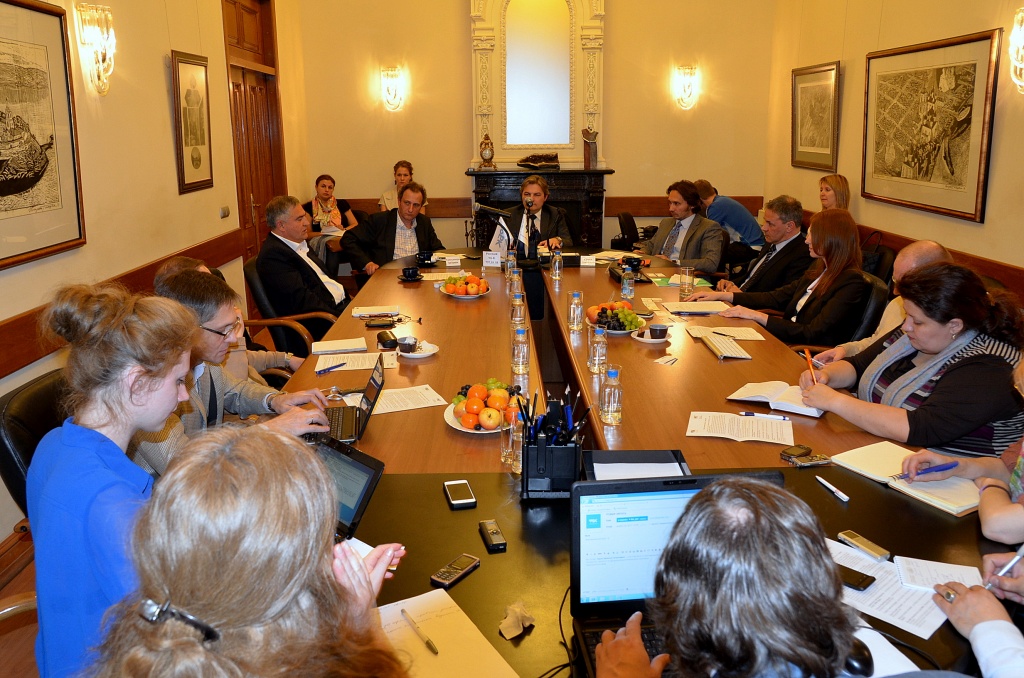Home page>
Press center>
News>There are more questions to the “deoffshoring” than to the offshore entities – experts of FBK Economy Club
There are more questions to the “deoffshoring” than to the offshore entities – experts of FBK Economy Club
Date of publication
25.04.2013
Alexey Yakovlev, Head of the FBK Legal Tax Litigation Practice, opened the sitting and pointed out that the issue of terminology should be tackled first – what should be referred to the “offshore” and what should not. There is a widely spread delusion that an offshore is any territory with preferential tax environment. However, the international criteria developed by OECD to recognize the offshore or tax Havens focus not so much and not only on the attractive taxation conditions but rather on the extent of involvement in the international information interchange. And the choice in favor of offshores is not always dictated by the aspiration for tax optimization but more often than not is caused by the yearning for extra protection of assets through using, as well, foreign law and for corporate structure optimization. Concerning the official efforts to “deoffshore”, the specialist pointed out that both coercive and incentive actions should necessarily be combined. In this connection the report of “Improving the appeal of Russian jurisdiction for business activities” developed by President Administration should be on the whole welcomed. In respect of the well-known bill №196666-6, the first reading of which was approved in February this year, providing taxation bodies with the possibility to obtain information about individual accounts and transactions, this procedure, to avoid any abuse, should be thoroughly regulated and the liability of infringement should be established for the officials. At the same time it is rather difficult to resist this trend towards growing information openness as it is of global nature.
Anna Grischenkova, Head of the FBK Legal Dispute Resolution Practice, backed up Alexei Yakovlev; she noted that it was not yet clear what criteria would be used to determine an “offshore” status of business, and whether that notion would be extended for the purpose of obtaining information. The lawyer said that if in court it was the plaintiff who usually had to prove his rightfulness, the recent hearing in the RF Supreme Court of Arbitration of case №ВАС-14828/2012 made a new precedent: if the respondent is an offshore company it is the company that has to prove its good faith and disclose all company owners including final beneficiaries.
Yuri Simachev, Senior Researcher of the Institute for Business and Market Analysis under the HSoE noted that the offshores reflect the state of affairs in modern economics: “Global companies presume the presence of global offshores as one of economic tools”. Companies use them for various reasons: some feel more comfortable to work, to come to new markets and save on taxes. But very often the work through offshores is the indicator of risks at the own national market. “Low predictability of state policy puts businessmen in such conditions when to use offshores is the only means to protect the business”, believes Yu. Simachev.

Anna Grischenkova, Head of the FBK Legal Dispute Resolution Practice, backed up Alexei Yakovlev; she noted that it was not yet clear what criteria would be used to determine an “offshore” status of business, and whether that notion would be extended for the purpose of obtaining information. The lawyer said that if in court it was the plaintiff who usually had to prove his rightfulness, the recent hearing in the RF Supreme Court of Arbitration of case №ВАС-14828/2012 made a new precedent: if the respondent is an offshore company it is the company that has to prove its good faith and disclose all company owners including final beneficiaries.
Yuri Simachev, Senior Researcher of the Institute for Business and Market Analysis under the HSoE noted that the offshores reflect the state of affairs in modern economics: “Global companies presume the presence of global offshores as one of economic tools”. Companies use them for various reasons: some feel more comfortable to work, to come to new markets and save on taxes. But very often the work through offshores is the indicator of risks at the own national market. “Low predictability of state policy puts businessmen in such conditions when to use offshores is the only means to protect the business”, believes Yu. Simachev.
Eugene Tarlo, Committee for Economic Policy under the Council of Federation, considered the main reasons for the Russian companies to use the offshores to be their “dissatisfaction with the investment climate, insufficient protectability of the right of property, dissatisfaction with the legislative and judicial practice”. The Senator believes that the wish to conceal the owner of business or its criminal nature make only a tiny portion of the list of factors contributing to going offshore”. According to him, 80% of Russian companies working through offshores belong to the businessmen from the Forbes list that the country leaders know in person. E. Tarlo believes that each of them should be worked with individually in terms of “deoffshoring” and adds that up to now the offshore businesses helped to solve problems in our economics, so it is not at all evident that total deoffshoring is good.
Stanislav Sushko, NB “Trust” Vice-president, is sure that the main driving force for businesses to work through the offshores is the unpredictability of rules of play. “The overwhelming majority of those who work through the offshores are in no way connected with money laundering. The offshores today represent more stable jurisdictions, which also provide with legal tools for more efficient, compared to Russia, protection of property rights” S.Sushko pointed out. When commenting on bill № 196666–6, which provides access for taxmen to information about individual bank transactions, the expert noted “We have no protection against state authorities today. Theoretically you may bring an official to account for an unjustified request for information, but there are no such cases in practice”.
Stanislav Sushko, NB “Trust” Vice-president, is sure that the main driving force for businesses to work through the offshores is the unpredictability of rules of play. “The overwhelming majority of those who work through the offshores are in no way connected with money laundering. The offshores today represent more stable jurisdictions, which also provide with legal tools for more efficient, compared to Russia, protection of property rights” S.Sushko pointed out. When commenting on bill № 196666–6, which provides access for taxmen to information about individual bank transactions, the expert noted “We have no protection against state authorities today. Theoretically you may bring an official to account for an unjustified request for information, but there are no such cases in practice”.
